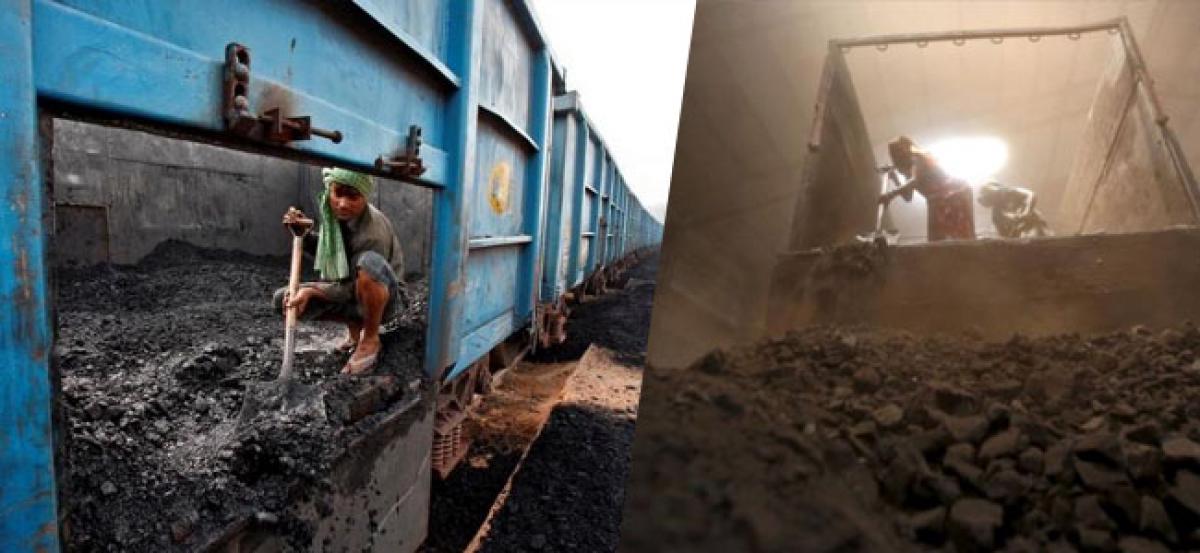Live
- First Impressions and Unboxing of the MacBook Pro M4: A Powerhouse for Professionals and Creators
- China Gears Up for Potential Trade War Amid Trump’s Tariff Threats
- Small Farmers Gain Less by Selling to Supermarkets: Study Reveals
- Why Despite the Controversy, America Is Anticipating the Mike Tyson vs. Jake Paul Fight
- Sanju Samson and Tilak Varma Shine: Record-Breaking Feats in 4th T20I Against South Africa
- India Urges $1.3 Trillion Annual Climate Support for Developing Nations
- Bad air: 106 shuttle buses, 60 extra Metro trips planned to make Delhiites give up cars
- WHO reports declining monkeypox cases in Congo
- CM Attends Kotideepotsavam on Kartika Purnima
- PKL Season 11: Raiding trio of Devank, Ayan, Sandeep help Patna Pirates rout Bengal Warriorz
Just In

Senior Indian government officials tasked by Prime Minister Narendra Modi with reviewing energy security are recommending the break up of the country\'s coal monopoly, Coal India Ltd (COAL.NS), within a year.
New Delhi: Senior Indian government officials tasked by Prime Minister Narendra Modi with reviewing energy security are recommending the break up of the country's coal monopoly, Coal India Ltd (COAL.NS), within a year.
Attempts to break up the world's biggest coal miner would be met by strong resistance from powerful unions representing the company's employees of more than 350,000. The government backed down from a similar proposal in the face of union protests in 2014.
Around 70 percent of India's power generation is coal based. The country is the world's third-largest producer and its third-biggest importer of coal, which the government wants to change by boosting local coal production.
In a presentation seen by Reuters, government officials recommend that Coal India - with a stock market valuation of $28 billion - should be broken up into seven companies, which they say would make it more competitive and efficient.
The proposal, dated Nov 30, is expected to be presented to Modi soon, three government officials with direct knowledge of the situation said. They declined to be identified because the information has not been publicly released.
Calls to a Coal India spokesman went unanswered.
A source close to power and coal minister, Piyush Goyal, said the ministry would review its stand on Coal India depending on what the prime minister says.
Coal India is the country's second-biggest employer, but critics say it is bloated and inefficient. Its output-per-man shift is estimated at one-eighth of Peabody Energy (BTUUQ.PK), the world's largest private coal producer, filed for bankruptcy protection this year.
Under Modi's government though, production has risen sharply as environmental and other clearances to develop mines have been fast-tracked. The company is also spending billions of dollars on buying modern machinery to raise productivity.
The government wants Coal India to increase production of coal to 1 billion tonnes a year by 2020 from around 539 million tonnes in the fiscal year that ended in March. It wants India as a whole to produce 1.5 billion tonnes a year by 2020.
Modi was exploring a breakup of Coal India before taking office, Reuters reported in 2014, but the government put the idea on the back burner following protests by unions. (reut.rs/2gXYD5L)
Unions fear restructuring Coal India would almost certainly lead to job cuts and work being outsourced to private companies, so are likely to protest against a break up.
"What happens is that once a big company is broken down, it is easier to control the smaller ones," said D.D. Ramanandan of the All India Coal Workers' Federation, which he said represents more than 100,000 workers of the company. "But if it happens, we will oppose it. We will oppose it through all ways possible, including strike."
ENERGY SECURITY
In late October, Modi set up 10 groups of senior bureaucrats to "undertake a critical review" of government work in a number of areas, including energy, transport and agriculture.
The proposal to break up Coal India comes from one of these groups - nine top bureaucrats, including ones from the ministries of coal, power, oil and mines. They were asked to come up with policy proposals to promote energy security and the environment.
Under Modi, Coal India's production growth rate has nearly doubled, marking one of the administration's biggest successes. Fuel shortages for power plants have turned into oversupply.
Restructuring is likely to be harder, but is crucial to the government's ambition to sell 10 percent of the company to raise funds for further growth and investment. The government owns just under 80 percent of the company.
Coal India wants to spend billions of dollars in the next few years to buy equipment and modernize mines. Miners still commonly use shovels and picks to dig for coal underground.
The company also plans to stop filling most vacancies arising from retirements over the next three years, and outsource more mining to private companies.
Coal India unit Mahanadi Coalfields pioneered outsourcing of mining work a few years ago and is now the company's biggest producer and fastest-growing unit. Contractors carry out about 90 percent of the unit's mining.
Coal India is a holding company with seven producing units and a planning and consultancy firm. The producing units have their own administrative set-up led by a chairman, so breaking them up to run as individual companies may not be difficult, analysts said.

© 2024 Hyderabad Media House Limited/The Hans India. All rights reserved. Powered by hocalwire.com







